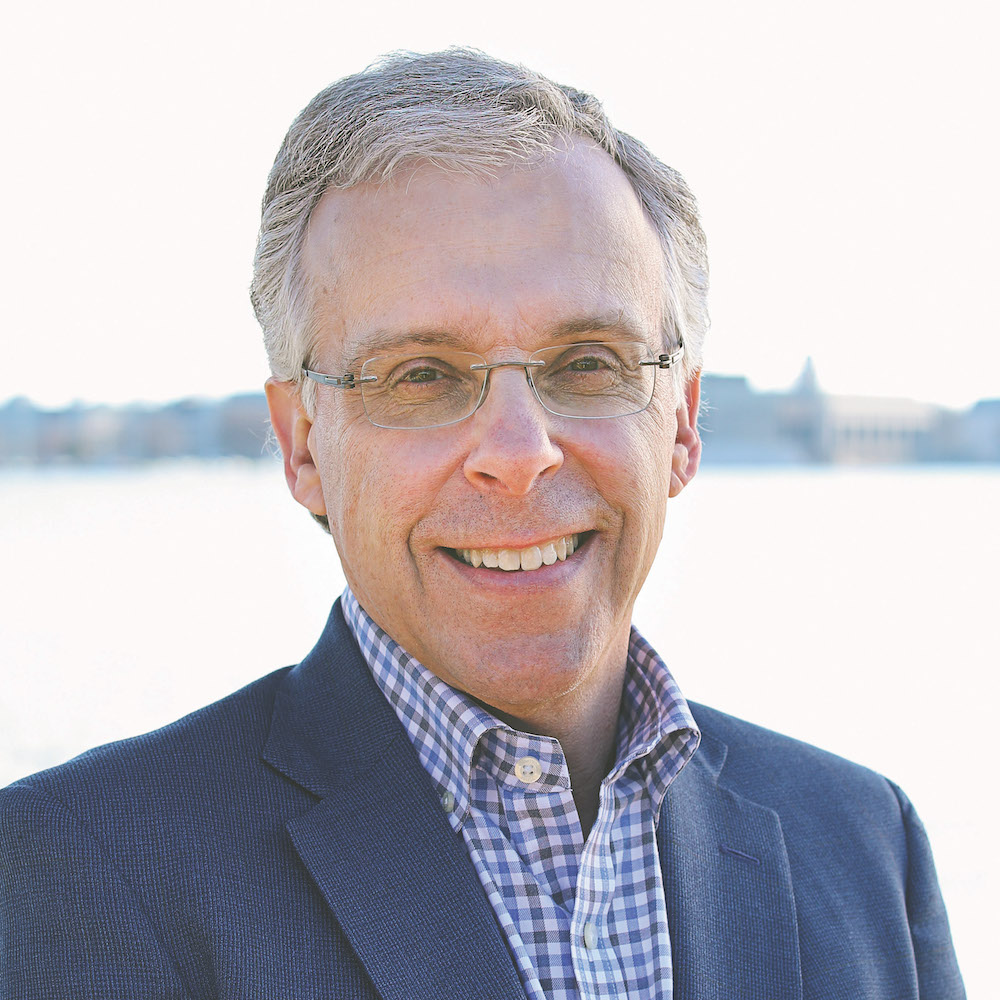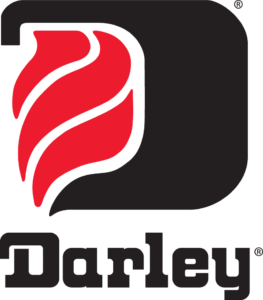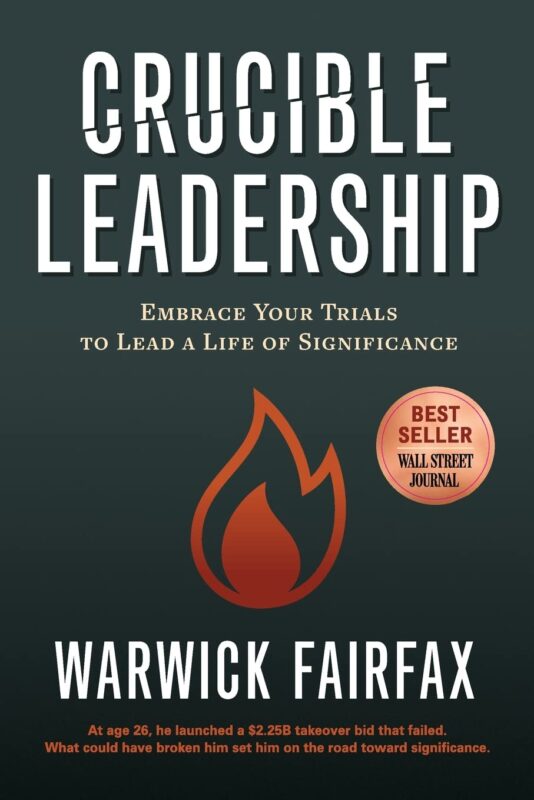
Warwick Fairfax is the Founder of Crucible Leadership, a philosophical and practical approach for turning business and personal failures into the fuel for living life on purpose, in service to others. In this interview, Warwick shares the wisdom gained from losing his 150 year-old family business worth two-billion-dollars. He talks about how he became a person of intention and reflection. He discusses how we need to delve into our values and beliefs and live in alignment with them. He shares why character means more than credentials. Listen in for the ultimate lesson on working through adversity and the importance of resilience.
Key Takeaways
[1:51] Warwick is a big cricket fan. He looks forward to watching a big upcoming Australian cricket tournament on an obscure cable channel in the U.S.
[3:24] Warwick grew up in Australia in his family’s 150-year-old media business. It felt like it was his duty to go into the company. He went to Oxford, as his father had done. He worked on Wall Street, then got his MBA at Harvard Business School. He was seen by his parents as the heir apparent. He could not choose not to go into it.
[5:38] Warwick believed the company wasn’t being well-run. In his youthful idealism, he launched a $2.25 billion takeover in August 1987. Things went wrong from the start. Other family members sold out and didn’t believe in Warwick or his vision. The company had an unsustainable level of debt. Warwick tried everything to keep it going. In 1990 they filed for bankruptcy. The company was sold.
[7:20] Warwick’s wife is American and the couple moved to America in the early ’90s; they have been here ever since. Warwick’s crucible was devastating. In Crucible Leadership, a crucible is defined as a devastating setback or failure that fundamentally transforms your life. It was excruciating. How could he have been so dumb with a Harvard MBA? Warwick was in a bad pit of despair. He was at rock bottom.
[9:40] Warwick was 26 years old when he launched the takeover. Blue-chip merchant bankers advised him not to do it. So he found less reputable bankers who told him, sure they can do it. They just didn’t tell him that it wouldn’t be sustainable. Warwick ignored the good advice and listened to the bad advice.
[12:38] Warwick credits his stability with his Christian faith which has always been the center of his life. His crucible brought him closer to his beliefs. Warwick believes God loves us all unconditionally. He doesn’t need our stuff or our successes; we’re not our rank or position, we’re valued as human beings, beautifully and wonderfully made. Warwick’s faith is a cornerstone.
[13:32] Warwick’s wife loves him unconditionally. Losing a couple of billion did not change that. In the ’90s, Warwick and his wife started having children. Warwick found meaningful work, such as doing finance at a local aviation services company and business analysis. The love of his family strengthened him. As he says on the podcast, Beyond the Crucible®, you’re not defined by your worst day.
[14:40] You have to dig deeply into your fundamental beliefs and values; are you going to be defined by your biggest mistake or this biggest thing that’s happened to you? When something bad happens to you, you can either be angry and bitter at others or yourself for years, or you can say, “This is awful; this is unconscionable; what I did was stupid; OK, but I have a choice how I move on from here, how I live.”
[15:51] Warwick’s essential problem was that he was living somebody else’s life. You’ve got to live your life and do what you were called to do, regardless of what laudable professions your parents have followed. You love your parents, but you don’t need to do what they did. You’ve got to be you.
[16:52] Failure can be helpful if it leads you to examine yourself. Often, vision comes out of the ashes of your crucible. The key is you’ve got to live your own life. You can’t inherit a vision. You’ve got to own it. You’ve got to feel like it’s your vision. That’s at the core of leading with uncompromised authenticity.
[19:57] When you grow up in wealth, the crucibles are different but they’re there. Warwick always felt extremely stressed by the sense of obligation to go into the family business. Growing up, if Warwick got in legal trouble, he knew it would be front-page news. He could not afford to fail and embarrass his family. Life won’t always be perfect. You don’t need to look for failure or crucibles.
[21:57] Crucible Leadership surveyed around 5,000 people asking how many of them had experienced crucibles of life-changing circumstances over their lives. It was 71%. There’s a 70% chance that people you know have gone through crucibles. Be forewarned before the battle. Have a game plan.
[23:23] Over the years, Warwick has asked executives what their values and beliefs are and to what degree they are living in alignment with their values and beliefs. If they are out of alignment, he asks, would they rather change their values and beliefs, or change how they live? They always want to get in alignment with their values and beliefs. Ask the question. People often miss that they are not aligned.
[25:35] If coaches don’t ask their executive clients about values and beliefs, nobody may ask and the clients may never think about it. They may go through life asking “Why is life so difficult? Why am I having all these crucibles?” Well, it may be self-inflicted. Maybe living out of alignment with their values and beliefs is part of the reason.
[26:23] Warwick offers “must-dos” to lead through a crisis. First, your team must feel heard. That doesn’t mean you do everything they say. Show empathy, appreciate their concern, and explain why you are going in a different direction. If they feel heard, they are OK with a different decision, as long as it is not a moral difference. Your team should know you care about them as people.
[28:47] If you listen to a team, and you’ve never taken input from any of them in 10 years, just saying “I hear you,” is not going to fly. At some point, you’ve got to take some input from your team, or listening is artificial. You need to know your blind spots. If you’ve got bright people on your team, you’ve got to trust them. If they all agree on something else, there’s a good chance that they’re right. Be humble.
[30:34] Ego stops us from doing things that every business book advises. Every Executive coach will say, “Trust your team.” Because of ego, we don’t do it, and it leads to business failure or suboptimal performance.
[31:39] It’s not just about getting to know people but about caring. You can’t teach people to care. If you don’t feel that people are worthwhile and deserve to be cared for, Warwick advises you to step away; resign. Let some other man or woman step into your job who can do a better job. If you have people on your team who demonstrate they don’t care for others, let them go and do damage somewhere else.
[35:20] Warwick states that hiring people that don’t care is bad for long-term company performance. If you don’t provide a caring, nurturing environment, you will not hire good people. It’s as hard to hire good people as it has been in the last hundred years. If you believe in your company’s long-term performance, you’ll hire people who care.
[36:33] Warwick would rather hire someone who cares than someone with the highest academic credentials. Their team will stick with that leader who cares. Hire for character. It’s the right economic choice and business choice. It’s the right ethical and values choice.
[38:44] Warwick reflects on what he as an executive coach might have told his 26-year-old self, but he says it wouldn’t have helped. He would not have been moved from his plan at 26. Sometimes things happen and you have to go through them to learn the lesson.
[39:56] In general, with young people, Warwick would coach them to make sure they understand their values, ethics, and beliefs. He would ask how what they are doing serves their values, ethics, and beliefs. People following a calling in line with their values and beliefs don’t stop at roadblocks. If they need help, they ask for it.
[40:45] Warwick will sometimes ask his team to reassure him before a presentation because he knows the material, but his emotions tell him he might fail. A strong, confident person is willing to admit their vulnerabilities and ask for help, at an appropriate level of sharing. It doesn’t make you less of a leader, admitting you’re a little bit nervous.
[42:33] When you go through a crucible, don’t waste it. Learn the lessons. Have After-Action Reports. Learn to do what fits your values, beliefs, and wiring better.
[45:39] Warwick shares his views on business valuation. Executives often wrap their identity in what they do. They wonder if they sell low if that makes them worth less as a person. After they sell, at any price, what are they, since they are not Joe Business-owner? Don’t let your business identity stop you from making a rational business decision.
[47:48] Don’t just have an exit strategy; have a life strategy after selling the business. There are many worthwhile options, such as heading a non-profit, donating your time, creating a new start-up, or becoming a mentor, advisor, or angel investor. Close one chapter and start another chapter. Know your why. You’ve sold your company, not your identity.
[50:24] It’s hard not to see your identity wrapped up in what you do. It’s easy to say; it’s really hard. It’s normal to feel pain when you sell a business. Jan cites Clayton Christensen, “How will you measure your life?”
[51:26] Closing quote: Remember, “If there is no struggle, there is no progress.” — Frederick Douglass
The Leadership Podcast is sponsored by W.S. Darley & Company.
Founded in 1908, Darley remains a family owned and operated business, providing the highest quality equipment solutions to our country’s warfighters and firefighters.
Learn more at darley.com and darleydefense.com
Quotable Quotes
“It was my sacred duty to go into the family business because we didn’t just produce widgets, we produced something that was of service to the nation of Australia. … This sense of duty was so hard-wired in me, I could not not go… Share on X “I’m pretty good at giving grace to others; pretty bad at giving grace to myself. … I have a tendency to think if there's a problem in the world, it’s my fault. I tend not to blame others.” Share on X “They said, ‘Warwick, the numbers don’t add up, don’t do it.’ Well, that wasn’t what I wanted to hear.” Share on X “When you go through a crucible, it either draws you closer to your verities and beliefs or further away.” Share on X “We say this all the time; we have our own podcast, Beyond the Crucible®, ‘You’re not defined by your worst day.’” Share on X “You don’t always have a choice about what happened to you but you can choose how you look at your life, moving forward. That’s the essence of beginning to get out of the pit of despair and beyond your crucible.” Share on X “My dad was sort of the intellectual guy that would have been a better philosophy professor. He was not a business guy at all. I mean, John Fairfax, my great-great-grandfather was a business guy but those genes had long since faded… Share on X “The key is you’ve got to live your own life. … It’s great to love your parents but you can’t inherit a vision. You’ve got to own it. You’ve got to feel like it’s your vision. So that’s probably at the core of leading with… Share on X “Unless you ask the question, they don’t even realize they’re living out of alignment with their values and beliefs because they don’t know what [they are]. We, as coaches, can really help our clients by just asking those questions.… Share on X “Typically founders are not very good general managers. They’re good entrepreneurs but they’re just different skills, so be humble enough to trust your team. It sounds so simple and so easy but ego gets in the way and that’s the… Share on X “Every executive coach will say, ‘Trust your team.’ This is not new, what I’m saying. But because of ego, people don’t do it. It’s so sad; frankly, it’s stupid. It will lead to business failure or suboptimal performance.” Share on X “I believe that hiring people that don’t care is bad for profitability and bad for long-term performance of the company. Maybe not short-term earnings per share, but long-term, because people like to work for people who care.” Share on X “Young people increasingly have choices and if you don’t provide a caring, nurturing environment, you won’t hire them. It’s as hard today to find good people as it’s ever been in the last maybe 100 years. … If you believe in … your… Share on X “If you’re following a calling that you’re passionate about that’s in line with your values and beliefs when you hit those roadblocks, you won’t stop. And when you do hit them, … a brave man or woman asks for help.” Share on X “You’re more than just your title. You’re more than just a nameplate on your door. If that’s who you think you are, then that’s very tragic because you’re set up for misery and a bit of a fall. So, there’s some soul work, in the… Share on X
These are the books mentioned in our discussion with Warwick.
Resources Mentioned
- Sponsored by: Darley.com
- Rafti Advisors. LLC
- Self-Reliant Leadership. LLC
- Warwick Fairfax
- Crucible Leadership
- Beyond the Crucible® Podcast
- Cricket Tournaments in Australia
- Fairfax Media
- Oxford
- Harvard Business School
- Douglas MacArthur
- West Point
- Drexel Burnham
- John Fairfax
- The MacKay 66
- Harvey MacKay
- Clayton Christensen





Recent Comments